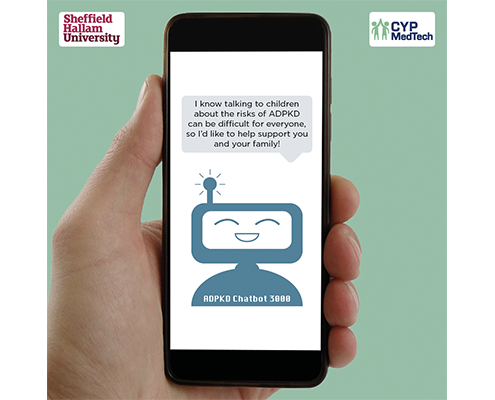Co-designing a chatbot to support family discussions about ADPKD
Wednesday 18 August 2021
NIHR CYP MedTech are collaborating with Sheffield Hallam University to co-design a chatbot to support families in discussing Autosomal Dominant Polycystic Kidney Disease (ADPKD).
ADPKD is an inheritable condition that begins to show symptoms in adulthood. The condition is characterised by the development of cysts in the kidneys, possibly requiring dialysis and/or kidney transplant to manage it in later life. However, by identifying young people who are at risk from inheriting the condition, it is possible to monitor them for cyst development and in some cases treat them with medication to delay the disease onset and reduce its severity.
To be able to monitor young people, ethically they have to made aware of the risks from ADPKD and this means parents have to explain about the genetic condition and its implications. However, this can be a very sensitive conversation and some parents often fear upsetting their children. Finding the right time to have a difficult conversation about the risk of a future serious illness is challenging because of the emotions that are evoked for parents and their children.
Not surprising therefore many parents often request additional help and support in having a conversation about an inherited genetic condition in the family. The issue is that there are not always enough health professionals to provide the advice and support parents and children require. With new developments in technology however, a research team are working with families to co-design a prototype chatbot that can help families and guide them in having difficult conversations using other families’ experiences, knowledge and insights. This chatbot is the first of its kind and so it is carefully researched to ensure the family’s wellbeing is at its core, and to ensure that young people get the information they need to enable them to access screening and treatment at an early stage.
Children, young people and families who have experience of ADPKD will be involved throughout the project, through interviews, co-design activities and workshops. As the project lead, Professor Alison Metcalfe, explains;
“Working with families, we want to use their experiences and strengths to support the design of a prototype chatbot that can support other families to have sensitive conversations about ADPKD. The chatbot will help parents to identify and choose the right time about ADPKD with their children and help them manage their own and their children’s emotional reactions to the risks associated with ADPKD.”
Please feel free to contact Gemma Wheeler (gemma.wheeler@nihr.ac.uk) to find out more.




